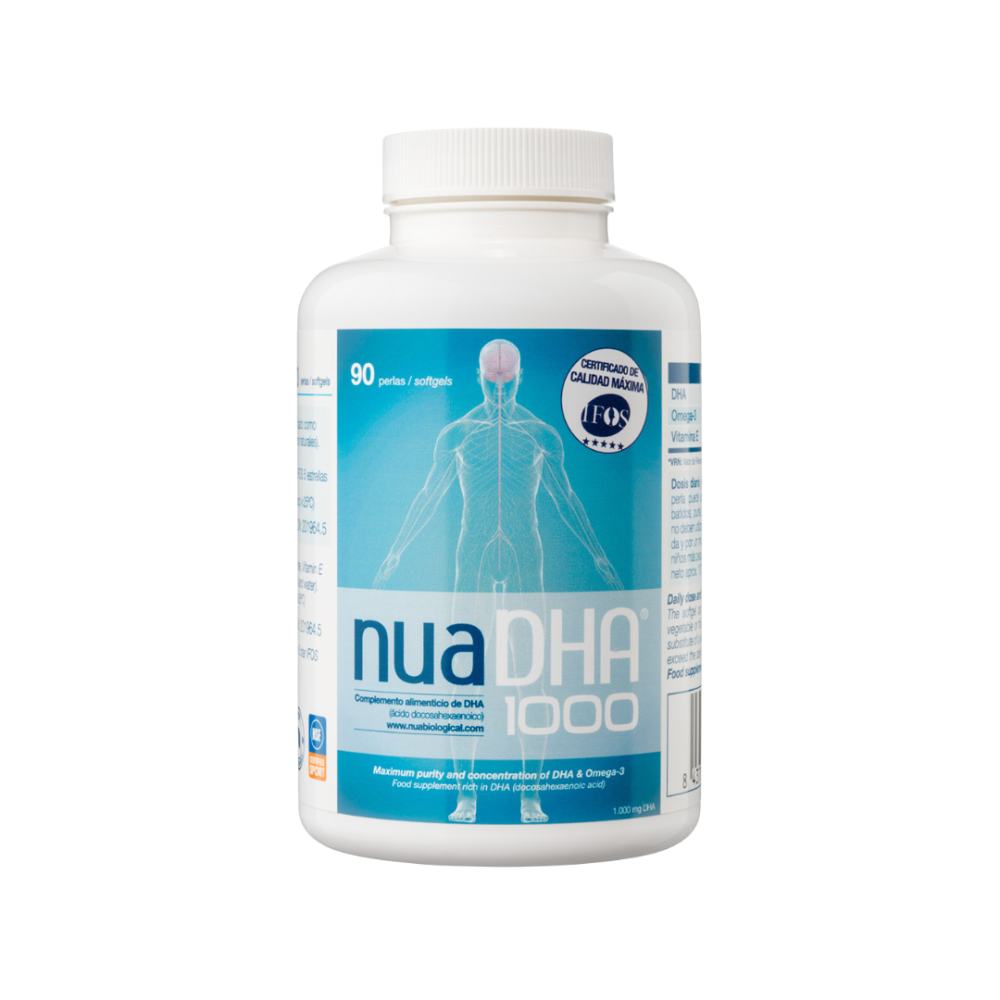One softgel of NuaDHA®1000 contains approximately 90% omega-3, of which more than 85% is DHA (docosahexaenoic acids).
Taking 2-3 softgels a week will cover the nutritional needs of omega-3 established by WHO.
On the other hand, European authorities have established that pregnant women can take up to 1000mg/day.
If the dosage is increased, you will obtain a supra-nutritional dose (more than 1000mg of oMega-3). In this case, in addition to covering the basic nutritional needs, the extra amount will be able to provide added health benefits that would not be achieved with lower doses.
According to EFSA*, DHA contributes to the maintenance of normal brain function.
DHA accounts for 30-35% of brain unsaturated fat, making it a key nutrient for building the brain during pregnancy, and the first years of a baby’s life. It so happens that situations where DHA deficiencies are common (e.g. multiple pregnancies, premature or adopted children) often appear associates with future learning, behavioral, psychomotor problems, etc., at school ages.
“The foetus depends entirely on the DHA it received from the mother during pregnancy, for optimal brain and visual development.”
What are the key benefits associated to DHA?
- Without a doubt, DHA is very important in supporting concentration and memory in childhood, as well as in adulthood. Taking it regularly will help you support cognitive function, improve attention span and processing speed, in additional to helping modulate mood.
- According to EFSA*, DHA contributes to the maintenance of normal visual function. More than 50% of the fat in the macula** is DHA. Therefore, it is a fundamental nutrient in children’s visual development, as well as a support against various visual alterations in adulthood.
- Given its abundance in sperm, DHA is very important for male fertility since an effective supply undoubtedly contributes to strengthening the structure of the sperm. This aspect is of great relevance if we take into account that more than 50% of infertility problems in couples are due to men.
- At a cardiovascular level, according to EFSA*, DHA contributes to the maintenance of normal triglyceride levels (minimum 2000mg daily dose) as well as normal blood pressure (3000mg daily dose combined with EPA).
**Macula: central area of the retina, responsible for clear and defined vision.
Find more product information at nuabiological.com
Indications and Instructions for use
1-4 daily softgels, always with food.
Some recommended uses for this format are:
- Whilst breastfeeding: it is important to guarantee and adequate supply of DHA. This will be passed to the baby through milk and thus continue to support its brain and visual development. For this, 1 softgel/day taken by the mother if breastfeeding, and in case of artificial breastfeeding, give 1 softgel/week to the baby by emptying the contents into a bottle (from 6 months onwards, up to 2 softgels/week given to the baby in two different days).
- During postpartum: it is important for the mother to recover her DHA deposits. This is vital since they can remain low up to 26 weeks after childbirth, and a low level of DHA can contribute to postpartum depression. Take 1 softgel a day.
- Nutritional support for children, teenagers or adults with learning and/or behavioral disorders: DHA is a structural nutrient for the brain (the second most important fat), and for this specific group of people, it can be deficient. Therefore, it is important to provide an extra complement by taking 1-2 softgels/day, or alternate taking 2 and 1 softgels on different days.
- Nutritional support for visual system: in situations where it is important to strengthen the anterior area of the eye, e.g. dry eye, herpes or corneal ulcers, dryness due to abuse of computers or contact lenses, menopause etc., take 2 softgels/day. Similarly, in the posterior area of the eye, DHA represents 55% of the unsaturated fat in the macula (central area of the retina that provides sharpness to vision) and therefore is a supportive nutrient to consider in disorders such as age-related macular degeneration (AMD), diabetic retinopathy, and/or glaucoma, take 2 earls/day.
- Support in neurodegenerative diseases: since DHA is the second most important structural far in the brain, it represents an important nutritional contribution in situations where there is brain deterioration (e.g. Alzheimer’s), take a minimum of 2 softgels/day.
- Nutritional support in athletes: numerous sports, whether sedentary (e.g. e-gamers, chess, archery, etc.) or active (e.g. tennis, soccer, skiing, basketball, etc.), require a good visual acuity and strategic capacity, which both lie in the cognitive function of people. As vision and cognition are two areas where DHA has recognized benefits, taking it as an athlete is highly recommended.
Note: NuaDHA®1000 (90 softgels) has the quality certification in sports “NSF Certified for Sport” which guarantees, batch by batch, the absence of more than 278 doping drugs prohibited by WADA (World Anti-Doping Agency).



 Get register and you will earn 75 points/€3.00
(Each €1.00 spent = 1 point, 1 point = €0.04 discount)
Get register and you will earn 75 points/€3.00
(Each €1.00 spent = 1 point, 1 point = €0.04 discount)